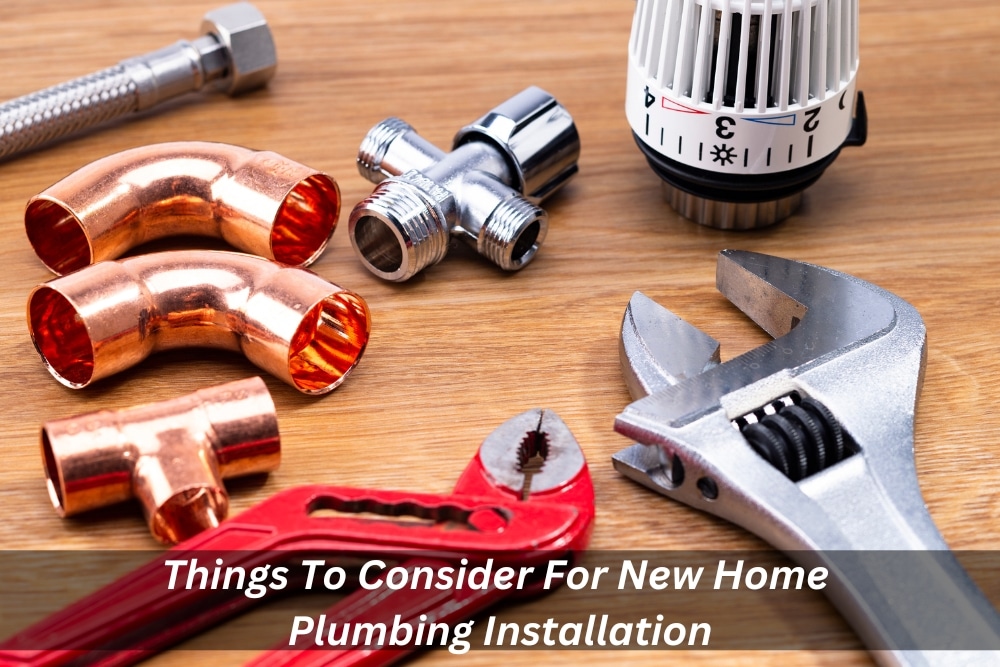Are you planning a new home plumbing Installation? Although it may sound like a simple process, there are actually a number of factors that need to be taken into account in order for your plumbing installation to be successful.
Installing new home plumbing is no easy task. It requires knowledge of the local building codes as well as expertise and experience. The financial cost of improper installations can be very high, so it’s important to get it right the first time.
Things you should consider when planning a new home plumbing installation
Local Building Codes: Before beginning any plumbing installation, it’s important to make sure that your plans comply with local building codes. This includes ensuring that all pipes, fixtures, and fittings meet the required standards.
Water Pressure: The water pressure in your home will determine the size and type of fixtures you can use. It’s essential to make sure that your water pressure is adequate for the institutions you plan to install.
Sewer Accommodation Stubs: Before installing any plumbing, it’s important to make sure that sewer accommodation stubs are in place. These stubs will allow for the connection of a sewer line from your home to the main sewer drain line.
Frost Line: The frost line in your area will determine the depth at which pipes must be buried in order to prevent freezing. It’s important to make sure that all pipes are buried below the frost line in order to avoid any potential problems with freezing.
Water Heater: A water heater is an essential part of any home plumbing system. It’s important to ensure that your water heater is the correct size and type for your home. You can check this section for hot water systems installation.
Plumbing Fixtures: The type of plumbing fixtures you choose will depend on your home’s style and the available budget. Make sure that you choose fixtures that are durable and long-lasting.
Water Supply System: Your water supply system should be designed to provide an adequate supply of water for your home. It’s important to ensure that the pipes and fittings are of the correct size and type for your home.
Shut-Off Valve: A shut-off valve is essential in any plumbing system. This will allow you to turn off the water supply pipe in case of an emergency or a plumbing problem such as the one from Reece.
Water Flows: It’s important to make sure that the water flows correctly through your plumbing system. This will ensure that all fixtures are supplied with an adequate amount of water.
Toilet Flanges: The toilet flanges or closet flanges must be installed properly in order for the toilet to function correctly. Make sure that you use the correct size and type of flange for your toilet. Check this section to get the best toilet installation and repairs.
Drainage System: The drainage system in your home should be designed to ensure that water is properly drained away from the home. Make sure that all pipes are of the correct size and type for your home. It should be compliant with the local council’s policy on drainage and plumbing.
These are some things you should consider when planning to build a new home plumbing installation. It’s important to make sure that all of the components are installed correctly in order to ensure a successful installation.
Choosing quality materials
When installing new home plumbing, it’s important to choose quality materials that will last. Quality materials are essential for ensuring a successful installation and avoiding costly repairs down the line. Make sure to use materials that are designed for the specific application you are using them for. For example, if you are installing a hot water system, make sure to use pipes and fittings that are designed for hot water.
Installing the right plumbing fixtures
When installing new home plumbing, it’s important to choose the right fixtures. This includes toilets, sinks, showers, and bathtubs. Make sure to choose fixtures that are of good quality and designed for the specific application you are using them for. For example, if you are installing a shower, make sure to choose a shower that is designed for the specific type of water pressure in your home.
Things To Check for New Home Plumbing Installation
Before you start using your new home plumbing system, it’s important to check all of the plumbing works. This includes checking for leaks and any other potential problems. Make sure to check all of the pipes (like vent pipes), fixtures, and fittings for any signs of damage or wear. If you find any problems, make sure to address them before using the system.
When should you contact a professional plumber?
When installing new home plumbing, it’s important to contact a professional plumber for assistance. A professional plumber will be able to ensure that your installation is done correctly and safely.
They will also be able to advise you on the best materials and fixtures for your home. Additionally, they can help you with any issues that may arise during the installation process. It’s important to contact a professional plumber before beginning any plumbing installation.
Ensure the License, Registration and Qualifications are Valid
When installing new home plumbing, it’s important to make sure that the plumber you hire is properly licensed, registered and qualified. Before hiring a plumber, ask for proof of their license and registration. Additionally, make sure that they have the necessary qualifications to carry out the job. It’s also a good idea to check references or reviews from previous customers to ensure that they are reputable.
What is the average cost to hire a plumber for plumbing installation on new homes?
The cost of hiring a professional plumber for new home plumbing installation will depend on the size and complexity of the job. Generally, the price will be based on an hourly rate. However, some plumbers may offer a flat fee, a package deal or specials for larger projects. It’s essential to get quotes from several plumbers before making your decision.


